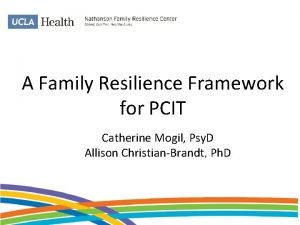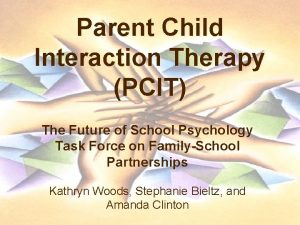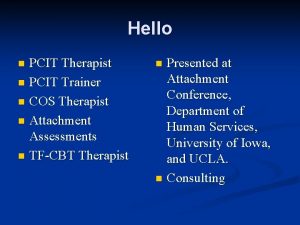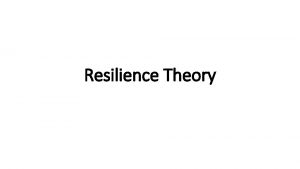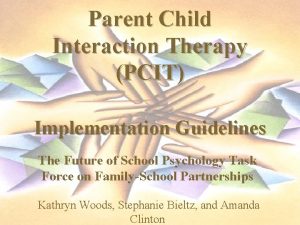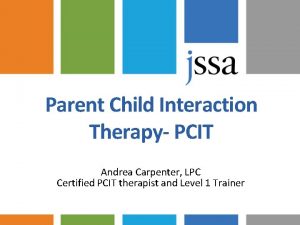A Family Resilience Framework for PCIT Catherine Mogil









- Slides: 9

A Family Resilience Framework for PCIT Catherine Mogil, Psy. D Allison Christian-Brandt, Ph. D

What is Resilience? “Ability to withstand rebound from disruptive life challenges…To struggle well” (Walsh, 2003) “Good outcomes in spite of serious threats to adaptation or development” (Masten, 2001) UCLA Nathanson Family Resilience Center Military Family Research Institute

PCIT MODEL Secure Parent-Child Relationship Social Learning/Behaviora l Principles Authoritative Parenting FACTORS OF RESILIENCE Connectedness Effective Caregivers Self. Efficacy Emotion Expression & Regulation Collaborative Problem Solving Flexibility Clear Communication Positive Outlook Encouraging Self-Expression Normalizing Child Behaviors ASSOCIATED PCIT COMPONENTS PRIDE Skills/ Special Time Selective Attention Nondirective Play “Emotion Coaching” PRIDE Skills Other Discipline Tools Safe, consistent limit setting Labeled Praises Parent Modeling On the Road Clear family roles Coaching Dev. Guidance Parent Modeling Time Out Parent Check. In Transitions Consistent Limits Praising the Positive Opposite Coaching

Case Example 5 year old female exhibiting frequent defiance/tantrums and episodes of crying following her father’s incarceration. Mother was struggling financially and had difficulty paying for treatment as well as basic necessities. FACTORS OF RESILIENCE Connectedness Effective Caregivers Self. Efficacy Emotion Expression & Regulation Collaborative Problem Solving Flexibility Clear Communication Positive Outlook Encouraging Self-Expression Normalizing Child Behaviors ASSOCIATED PCIT COMPONENTS PRIDE Skills/ Special Time Selective Attention Nondirective Play “Emotion Coaching” PRIDE Skills Other Discipline Tools Safe, consistent limit setting Labeled Praises Parent Modeling On the Road Clear family roles Coaching Dev. Guidance Parent Modeling Time Out Parent Check. In Transitions Consistent Limits Praising the Positive Opposite Coaching

Case Example 5 year old female exhibiting frequent defiance/tantrums and episodes of crying following her father’s incarceration. Mother was struggling financially and had difficulty paying for treatment as well as basic necessities. FACTORS OF RESILIENCE ✓ Connectedness ✓ Effective Caregivers ✓ Self. Efficacy Emotion Expression & Regulation Collaborative Problem Solving Flexibility Clear Communication Positive Outlook Encouraging Self-Expression Normalizing Child Behaviors ASSOCIATED PCIT COMPONENTS PRIDE Skills/ Special Time Selective Attention Nondirective Play “Emotion Coaching” PRIDE Skills Other Discipline Tools Safe, consistent limit setting Labeled Praises Parent Modeling On the Road Clear family roles Coaching Dev. Guidance Parent Modeling Time Out Parent Check. In Transitions Consistent Limits Praising the Positive Opposite Coaching

Case Example 5 year old female exhibiting frequent defiance/tantrums and episodes of crying following her father’s incarceration. Mother was struggling financially and had difficulty paying for treatment as well as basic necessities. FACTORS OF RESILIENCE Connectedness Effective Caregivers Self. Efficacy Emotion Expression & Regulation Collaborative Problem Solving Flexibility Clear Communication Positive Outlook Encouraging Self-Expression Normalizing Child Behaviors ASSOCIATED PCIT COMPONENTS PRIDE Skills/ Special Time Selective Attention Nondirective Play “Emotion Coaching” PRIDE Skills Other Discipline Tools Safe, consistent limit setting Labeled Praises Parent Modeling On the Road Clear family roles Coaching Dev. Guidance Parent Modeling Time Out Parent Check. In Transitions Consistent Limits Praising the Positive Opposite Coaching

Case Example 5 year old female exhibiting frequent defiance/tantrums and episodes of crying following her father’s incarceration. Mother was struggling financially and had difficulty paying for treatment as well as basic necessities. FACTORS OF RESILIENCE Connectedness Effective Caregivers Self. Efficacy Emotion Expression & Regulation Collaborative Problem Solving Flexibility Clear Communication Positive Outlook Encouraging Self-Expression Normalizing Child Behaviors ASSOCIATED PCIT COMPONENTS PRIDE Skills/ Special Time Selective Attention Nondirective Play “Emotion Coaching” PRIDE Skills Other Discipline Tools Safe, consistent limit setting Labeled Praises Parent Modeling On the Road Clear family roles Coaching Dev. Guidance Parent Modeling Time Out Parent Check. In Transitions Consistent Limits Praising the Positive Opposite Coaching

Case Example 5 year old female exhibiting frequent defiance/tantrums and episodes of crying following her father’s incarceration. Mother was struggling financially and had difficulty paying for treatment as well as basic necessities. FACTORS OF RESILIENCE Connectedness Effective Caregivers Self. Efficacy Emotion Expression & Regulation Collaborative Problem Solving Flexibility Clear Communication Positive Outlook Encouraging Self-Expression Normalizing Child Behaviors ASSOCIATED PCIT COMPONENTS PRIDE Skills/ Special Time Selective Attention Nondirective Play “Emotion Coaching” PRIDE Skills Other Discipline Tools Safe, consistent limit setting Labeled Praises Parent Modeling On the Road Clear family roles Coaching Dev. Guidance Parent Modeling Time Out Parent Check. In Transitions Consistent Limits Praising the Positive Opposite Coaching

UCLA Nathanson Family Resilience Center info@nfrc. ucla. edu 855 -231 -9500 https: //nfrc. ucla. edu/ www. facebook. com/uclanfrc www. twitter. com/ucla_nfrc
